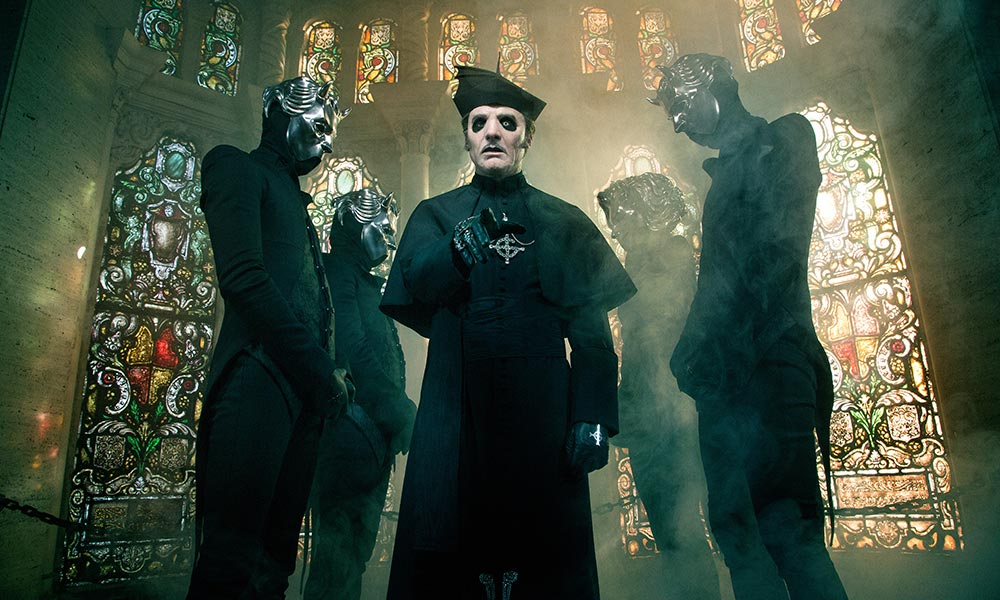Music Without Borders: Ghost’s Satanic Panic
Ghost’s devilish metal puts the “harm” in harmony.
Music has the power to transport listeners to cultures and places different from their own. In Music Without Borders, our writers introduce you to international artists, bands, and genres that explore the sounds that bring us together.
Written by Felix Kalvesmaki
Photo courtesy of Ghost
Swedish metal band Ghost has always been rather provocative. Frontman Tobias Forge walks the stage in corpse paint, and his lyrics cry out to a darker Lord than you’ll hear in gospel music. The band plays largely off of religious themes, with each album’s character adopting the Pope-like title of “Papa Emeritus.” This band, however, is anything but Catholic. The band’s most recent release, a single-split titled “Seven Inches of Satanic Panic,” covers themes of romance, intimacy, and devil worship. While devotion to Lucifer is not untread ground in metal by any stretch, there’s a whimsy theatricality to Ghost’s take on the macabre, defining them as a Swedish export.
Forge is the only known member of the band. He takes credit for the songwriting and vocals (which are sung rather than growled), while a gang of “Nameless Ghouls” (buttoned-up musicians in masks) back him on guitar, bass, drums, and keys. Since the band’s first release in 2010, Forge has been performing onstage as various incarnations of Papa Emeritus (so far, we’ve had Papas I-IV), who functions as the fictitious deacon of Ghost’s Satanic church. The title of Papa Emeritus works much like Catholicism’s Pope: every so often, one dies, and another must rise. For instance, the latest deacon, Papa Emeritus IV, had an induction ceremony during Ghost’s last pre-quarantine concert in 2020.
The Papa character brings a greater sense of meaning to Ghost’s live shows. Tracks like Meliora’s “Cirice” are an invitation to a darker world. This is a world of horror, and “There's no return / From this excursion,” as Meliora’s opening track “Spirit” warns. But the lyrics take a different meaning when performed to a room full of people. A dark, doomy call to a lower power, the track’s context changes in a live show. Lyrics like “Now there is nothing between us / From now our merge is eternal / Can't you see that you're lost? / Can't you see that you're lost without me?” pull you in close to Forge as he sings them. They make him your greatest savior, and your only hope. It feels much more personal when the music is right in front of you.
In concept, Ghost tours the world as a sort of cult. In reality, they’re a metal band playing dress-up. But take the bait for a moment, and live alongside the group’s frontman. In the world that Forge has created, his music is spreading a message of pure evil, and that’s entirely the point. His fans are devotees. His songs are hymns. He fancies himself a ringleader, and he’s here to do the devil’s work.
Photo courtesy of Mikael Eriksson
The band isn’t necessarily unpopular: thousands come to watch them perform, Loudwire named their track “Square Hammer” the metal song of the decade, and they boast millions of streams on Spotify. But there’s an inaccessibility to Ghost’s schtick that defines them, and limits them, as a Swedish band.
America, as we live it now, is still thoroughly Christian. “In God we trust” reads our money, “one nation under God” reads our pledge. We’re still bickering over religious liberty and what it means for abortion access and same-sex marriage, even after the Supreme Court has ruled both as civil rights. Compare that to Sweden, where according to the Pew Research Center, only 10% of people describe themselves as “highly religious.” This isn’t solely speculative, though. Ghost has had some issues recording and releasing music in the United States. Their music was initially banned from U.S. chain stores and mainstream radio. Though the U.S. has come to accept Ghost for all its zaniness, it’s a glaring example of how American culture differs from Nordic countries, where metal has historically thrived. Scandinavia produces the most metal in the world, so the genre means a great deal to those who call it home. Norway, for example, kickstarted black metal in the ‘90s. While some American listeners may find Ghost’s melody-driven Satanism a bit too niche, their sound has an appeal for those who want their death metal to come with a side of harmony.
This is why Ghost’s most special qualities — the heavy metal sound, the high-concept performances, and the Satanic spirit beneath it all — are so blasphemously cool. Ghost takes every late ’80s Satanic panic stereotype and turns it into music, giving a hearty, evil laugh while doing so.


